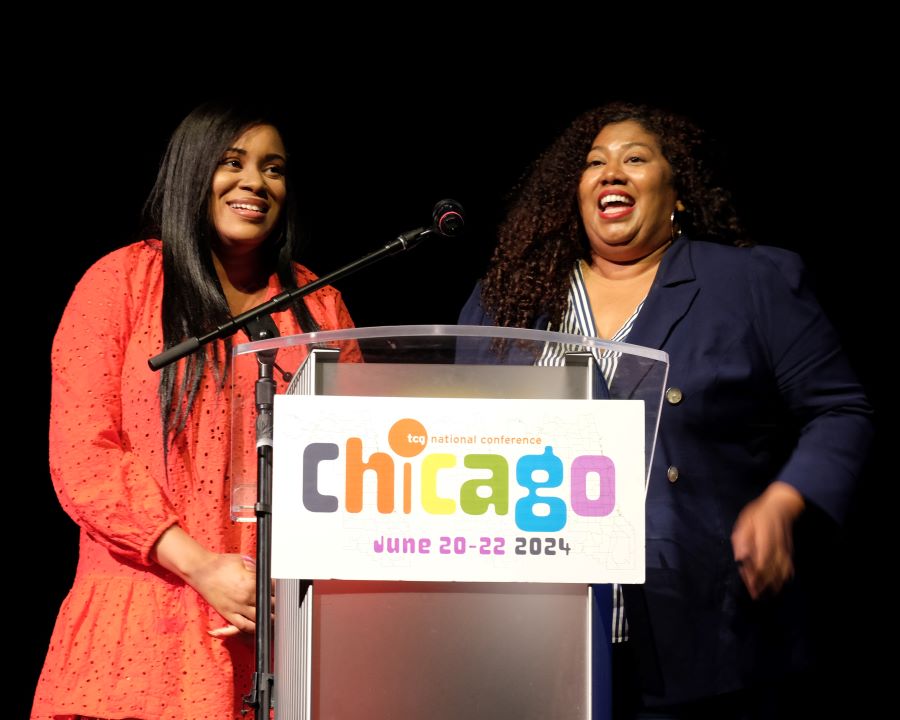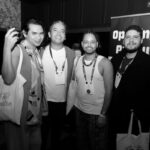“We are selling out—and we’ve gotten bomb threats,” said Teresa Coleman Wash.
Such were the ironies and stakes of this year’s Theatre Communications Group three-day National Conference in Chicago, June 20-22. At a censorship-focused panel on June 21, Wash, the executive artistic director of Bishop Arts Theatre Center in Dallas, spoke about the high cost of truth-telling within her community.
“We have some unique challenges in Texas,” Wash said. “Eighty percent of white nationalist propaganda originates in Dallas. Our productions are so impactful, we’re getting bomb threats.”
Her words took me back to another large gathering of theatre folk: the Florida State Thespians Festival I used to attend yearly as a teen. I remember how, back in 2017, Confederate flags loomed in Tampa’s public spaces, dire and aggressive, emboldened by national politics and public discourse. Right next to those flags, immigrant and queer high schoolers poured out of theatres, laughing with a radically loud living. Fast forward to 2024: Just one day prior to the 2024 TCG conference, we received devastating news that Gov. Ron DeSantis had vetoed all Florida state arts grants. Memory of my creative oasis ruptures.
It seems TCG’s closing plenary, “So Many Truths: Lorraine’s Legacy and the Future of Black Artistry and Activism in the American Theatre,” was aptly titled. The American theatre—and nation—is filled and fizzing with so many truths. While discussions throughout the conference reflected the cognitive dissonance and contradictions of our time, I reflect now on our interconnectedness. I consider the connection between breath and body, and among youth, elders, and the sharing of stories. I see the connection between high school theatre students energizing Tampa in 2017, dreaming of the professionals they could become, and the over 1,000 seasoned theatre professionals in 2024 running to catch train after bus in Chicago, crafting the industry they’ll one day hand to the young people.
We are connected in this cyclical striving for futurism.
From the first day, leaders fearlessly spoke truth to power during the Chicago Shakespeare Theater-hosted opening plenary, which notably featured provocations prompted by Jesse Cameron Alick, whose 2021 “Emerging from the Cave” study, commissioned by the Sundance Institute to explicate theatremakers’ pressing needs a year after pandemic shutdowns, featured interviews with over 70 artists and arts workers. Tasked with revisiting those themes, a powerhouse lineup of speakers included actor/producer/writer Donato Fatuesi, playwright Ife Olujobi, director and writer Jeanette Harrison, dramaturg/journalist Yasmin Zacaria-Mikhaiel, and Actors Theatre of Louisville artistic director Robert Barry Fleming.
Demanding labor equity and care for artists, Olujobi’s words stood out. She shared how, following their recent “$5000” piece, a number of organizations had responded not with change, but by inviting Olujobi to speak at public functions (including, ahem, TCG’s). They elucidated how this paradox lies at the heart of many organizations, which “uplift gesture and symbol” but not material survival. Harrison echoed Olujobi’s stance when discussing how the national theatre landscape fails to embrace Native creatives, saying, “The language keeps changing, but the results don’t.”
As real and grim as this portrait may seem, these speakers, among others, also imparted a deep sense of hope. Immediately following the plenary, I joined a cathartic Intergenerational Leaders of Color space, which was movingly, beautifully full. With TCG’s director of grantmaking programs, Emilya Cachapero, and Oregon Shakespeare Festival artistic director Tim Bond recounting to me the early days of this gathering, which used to be far smaller, I grounded myself in how change takes time and won’t always look linear. But it must come.
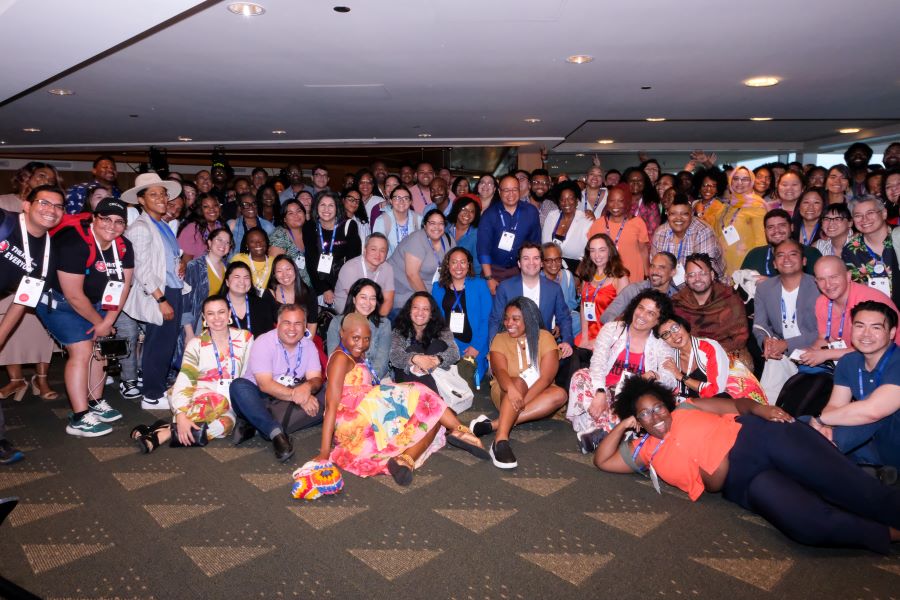
“I was encouraged that kindness and empathy emerged as two consistent themes amidst a broad range of session topics,” shared Elise Pakiela, who helped produce the conference alongside Katrina Herrmann and TCG’s Devon Berkshire. “As organizations experiment with new programming models and consistently work to better serve their communities, I think it is more important than ever to prioritize caring for arts workers and exercise grace in times of transition.”
At the opening night party and other happy hours, I reconnected with a few creatives I particularly admire and who participated in key panels. These included dramaturg and DePaul Theatre School dean Martine Kei Green-Rogers; intimacy professional, director, and Carnegie Mellon professor Kaja Dunn; playwright, director, and Kennedy Center American College Theater Festival manager Kelsey Mesa; director and new Playwrights’ Center producing artistic director Nicole A. Watson; and theatre and publishing professional Roberta Pereira, now executive director of the New York Public Library for the Performing Arts. Journeying through sessions with an eye to what would support our practice as femmes of the global majority, I particularly resonated with what Green-Rogers said during Thursday’s session, “Anti-Racism in Academia: Moving from Ideation to Practice,” led by prominent educators of color.
“It doesn’t matter what position you’re in, and I say this lovingly,” Green-Rogers said, “but it’ll always be a higher emotional burden being a woman of color.”
Yet throughout the weekend, these were exactly the leaders called upon to solve some of the industry’s greatest issues, as Green-Rogers and Jocelyn Prince would later point out during “Theatre Futures,” a panel hosted by American Theatre.
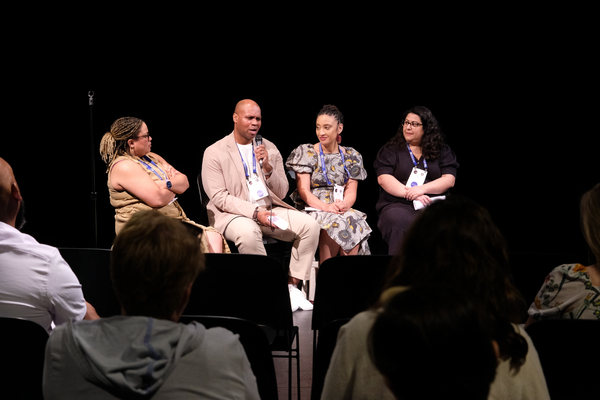
Attended by a few folks of color and many educators, Thursday’s “Anti-Racism in Academia” illuminated, among many challenges, how each school and state is impacted by trends of anti-DEI legislation and anti-queer censorship around the U.S. Some offerings at the conference, including this one, even deliberately refrained from recording to protect educators doing on-the-ground work in Southern states—a testament to the nation’s grim predicament. During the session, Dunn also discussed the ways people of the global majority must learn multiple “languages” to move about the world, and how this bicultural capacity allows us to envision new ways of working. Hearing this alongside Green-Rogers and Prince’s thoughts granted some sense of healing, showing that lived experience can constitute a superpower.
On Friday, Dunn and I were in the audience for “Creating Equitable Institutional Partnerships: Commissioning BIPOC Artists for Multigenerational Audiences,” which offered one way to reach youth and mitigate the folly of classroom-related bans. Walking us through a Mellon Foundation-sponsored extended partnership among artists and organizations—including Native Voices, Latino Theater Company, and Children’s Theatre Company—creative leaders gave us the ups and downs of commissioning writers of color to pen 16 shows for youth.
During the panel, Penumbra Theatre Company president Sarah Bellamy and CTC outgoing artistic director Peter C. Brosius discussed the importance of coming together across differences. They disclosed how challenging some “not bitter, but deeply honest conversations” proved, and how necessary it was for them to resist walking on eggshells around topics of programming and racial justice. They also explained how they uniquely catered the new-work development process to each writer’s needs, budgeting for time needed to slow down and workshop, and committed themselves to providing resources beyond a singular reading.
“You don’t have to have the answer,” said Bellamy, “but if you can name the challenge, see how holding that, speaking it, can open up space.”
At the historic Fine Arts Building, conference attendees had the honor of hearing from additional visionary voices within the Friday plenary, which featured a fireside chat between entrepreneur and author James Rhee and TCG’s interim CEO, Karena Fiorenza. Peter Sagal (in a virtual modality) and Corinna Schulenburg paid tribute to outgoing executive director and CEO Teresa Eyring for 20 years of trailblazing leadership, and we got to hear from Chicago powerhouses Marissa Lynn Ford and Miranda González, who served as conference steering committee co-chairs. For we who work at American Theatre, the event unexpectedly affirmed the work we do: When National Endowment for the Arts chair Maria Rosario Jackson discussed the many ways support for the arts can take shape, she repeatedly cited AT as a key source covering our industry-wide reckoning and renewal.
Another Friday highlight for those of us dedicated to the publications world was “Freedom of Expression and the Future of American Authorship,” held at The Understudy, Andersonville’s charming bookstore/coffee shop. Moderated by NYPL’s Pereira, this discussion is the one where we heard the prophetic and haunting words of Teresa Coleman Wash, as well as the thoughts of writer Howard Sherman and playwright Ike Holter. Pereira led an effort among the panelists to compile resources for attendees who might be struggling with the state of censorship. Holter and Sherman commented on how there are many insidious layers to repression, which can range from the legislative level to the more intimate impact of self-censorship. What words, I wondered, are taken from us before we can speak or even think them?
“We live in a country that was founded by Puritans,” said Sherman. With risks for Bishop Arts Center and safety precautions at events like their Banned Books Festival in mind, Wash encouraged us “to be courageous enough to tell the truth.” Sherman shared that while it’s impossible to predict when censorship will occur, it’s quick and if there’s no opposition, the proponents will succeed. This, they all agreed, is where community and social media come in handy.
“Shame works really well,” said Pereira.
Multi-hyphenates took to the Court Theatre stage on “South Side Saturday” to share their excitement and thirst for more deeply communicative collaborations. I was invited to speak at the first, “From Critique to Collaboration: Journalist-Artists Commune for Theatre’s Evolution,” and American Theatre hosted the second as part of “Theatre Futures,” a Ford Foundation-sponsored series featuring insights from panelists Martine Kei Green-Rogers, Jocelyn Prince, PennyMaria Jackson, and Charlique C. Rolle, all of whom are contributing essays to our Theatre Futures series (launched in our new Summer issue). With common threads of rejecting gatekeeping, maintaining pay transparency, and uplifting women of color, both sessions as well as several others were recorded by HowlRound and are available online.
Closing out the conference was the final plenary, “So Many Truths: Lorraine’s Legacy and the Future of Black Artistry and Activism in the American Theatre,” a dialogue of bold sincerity with Dominique Morrisseau, Ericka Dickerson-Despenza, Ifa Bayeza, and Valerie Curtis-Newton. Disagreeing over the nature of revolution (radical versus unified, service-oriented versus militant) and theatre’s particular role in activism, the impassioned conversation began with Hansberry’s legacy and ended more than an hour later than the scheduled time. Afterward, fellow artists of color and I discussed the productivity of tension, disagreement, and—as Morrisseau said—of grounding oneself in respect. Prior to the Hansberry panel, the iconic Jackie Taylor, founder of Black Ensemble Theatre, delivered a rousing speech on how “we are one,” a piece I found myself returning to again and again.
“We are all responsible for each other,” said Taylor.
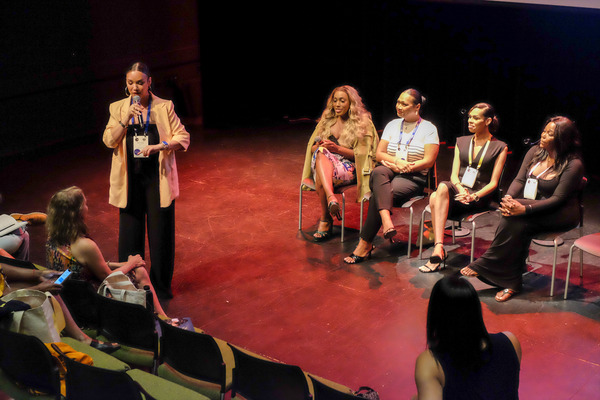
Indeed, when theatre is under attack, education is under attack, libraries are under attack, and journalism is under attack. No worker dedicated to the human spirit is immune. So why not be under attack together—as one?
When promoting TCG’s new Funds for the Dolls, which gives trans women of color in the performing arts access to unrestricted funds, Merrique Jenson reminded us of the staggering suicide rates among trans women of color. Even as it seems we fight an uphill battle within the arts, speakers throughout the weekend urged us not to lose sight of the way funding artists and fostering authentic representation can literally save lives. These are our stakes. This is our call.
Who is here today? Who is not here today? And who will be here tomorrow?
This conference provided a necessary, invigorating meeting ground for the national theatre ecology. In the future, I’m eager to see more people—more students, more arts workers on temporary contracts, and beyond—join the party. But as arts funding remains tenuous and legislation threatens to slice us down, nightmarish erasure overtakes my imagination.
I reimagine 2017: The teens un-laugh into stoicism, backward stepping into grayer schools with no arts funding. I reimagine 2024: The twinkle of abundance in Merrique Jenson’s eye melting into the reflection of an empty auditorium. I wonder whether these moments, “like the baseless fabric of this vision, the cloud-capp’d tow’rs, the gorgeous palaces, the solemn temples, the great globe itself,” will dissolve, as The Tempest’s Prospero speaks it.
Our struggles intertwine. I’m eager for a sustained and deeper coming together: heated discussions, guttural laughter, wrinkles of concern, and all. No B.S., as interim TCG leaders LaTeshia Ellerson and Karena Fiorenza urged. In my bones, I feel this is the only path to tomorrow, carefully planting and tending to the seeds of futurism. It’s not unhealthy to rearrange and re-envision the gardens of communal art-making. But the nation must remember: We still need them green. Watered, sunned, appreciated.
I’m a positive person. But I find myself lying awake, asking how we will fight for our hope and our gathering to remain. Will we be here tomorrow?
Gabriela Furtado Coutinho (she/her) is the Chicago associate editor of American Theatre.

